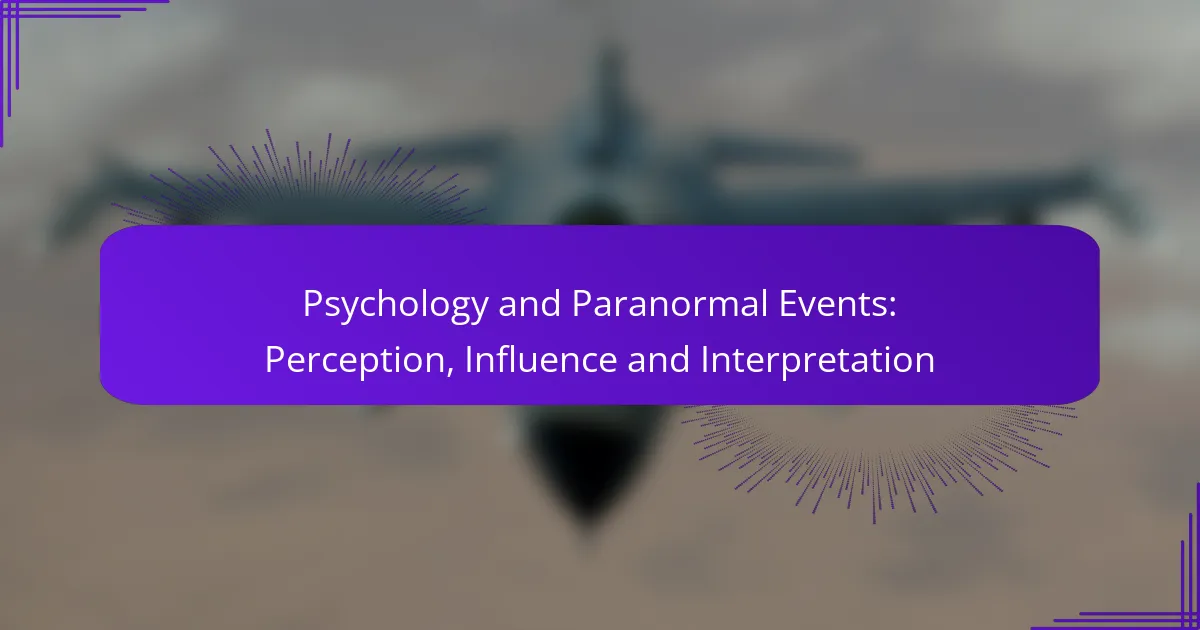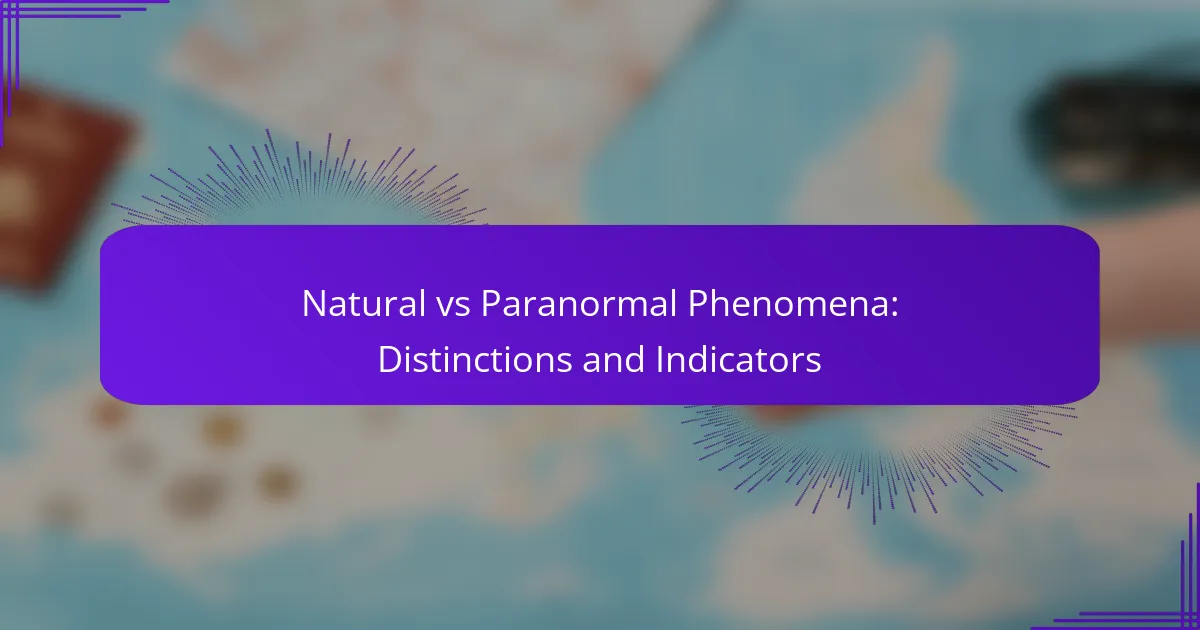The intersection of psychology and paranormal events reveals how our perceptions and interpretations are influenced by cognitive biases, emotional responses, and social contexts. These psychological factors play a crucial role in shaping beliefs about the supernatural, often leading individuals to either embrace or dismiss such phenomena. By exploring these elements, we can gain a deeper understanding of how human cognition and emotion affect our experiences with the paranormal.
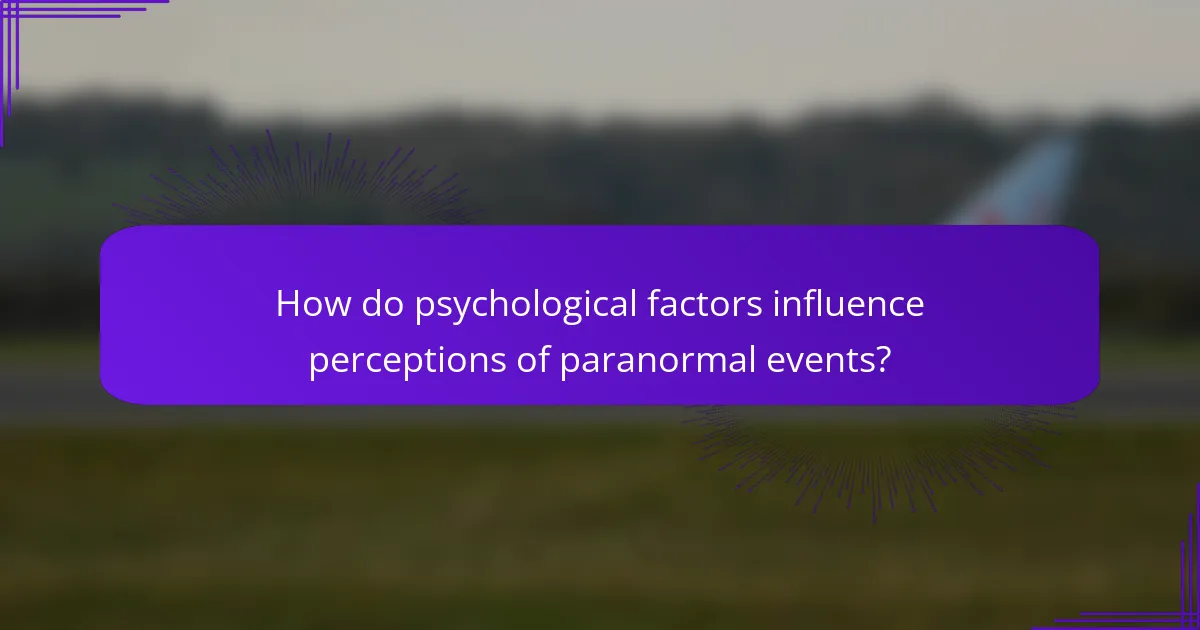
How do psychological factors influence perceptions of paranormal events?
Psychological factors significantly shape how individuals perceive and interpret paranormal events. Cognitive biases, emotional responses, and social influences all play crucial roles in determining whether a person believes in or dismisses such phenomena.
Cognitive biases in paranormal interpretation
Cognitive biases can lead individuals to misinterpret ambiguous stimuli as paranormal. For example, the confirmation bias may cause someone to seek out evidence that supports their beliefs while ignoring contradictory information. This selective perception reinforces their conviction in paranormal occurrences.
Another common bias is the availability heuristic, where people judge the likelihood of events based on how easily examples come to mind. If someone frequently hears about ghost sightings, they may overestimate the prevalence of such experiences in their own life.
Emotional responses to paranormal experiences
Emotions play a pivotal role in how paranormal experiences are perceived. Fear, excitement, or awe can amplify the interpretation of an event as paranormal, often leading to heightened suggestibility. For instance, a sudden noise in a dark room may trigger fear, prompting an individual to interpret it as a ghostly presence.
Conversely, positive emotional states can lead to a more favorable interpretation of ambiguous situations, making individuals more likely to attribute unexplained phenomena to supernatural causes. This emotional lens can skew rational analysis and promote belief in the paranormal.
Social influence on belief in the paranormal
Social factors heavily influence beliefs in the paranormal, as individuals often look to their peers for validation. If a person’s social circle discusses or believes in paranormal events, they are more likely to adopt similar beliefs due to social conformity. This phenomenon is particularly strong in communities where such beliefs are culturally accepted.
Additionally, media portrayals of paranormal events can shape public perception. Television shows, movies, and online content often dramatize supernatural occurrences, which can reinforce existing beliefs or spark new interests in the paranormal among viewers. This social reinforcement can create a feedback loop, further entrenching beliefs in the paranormal.
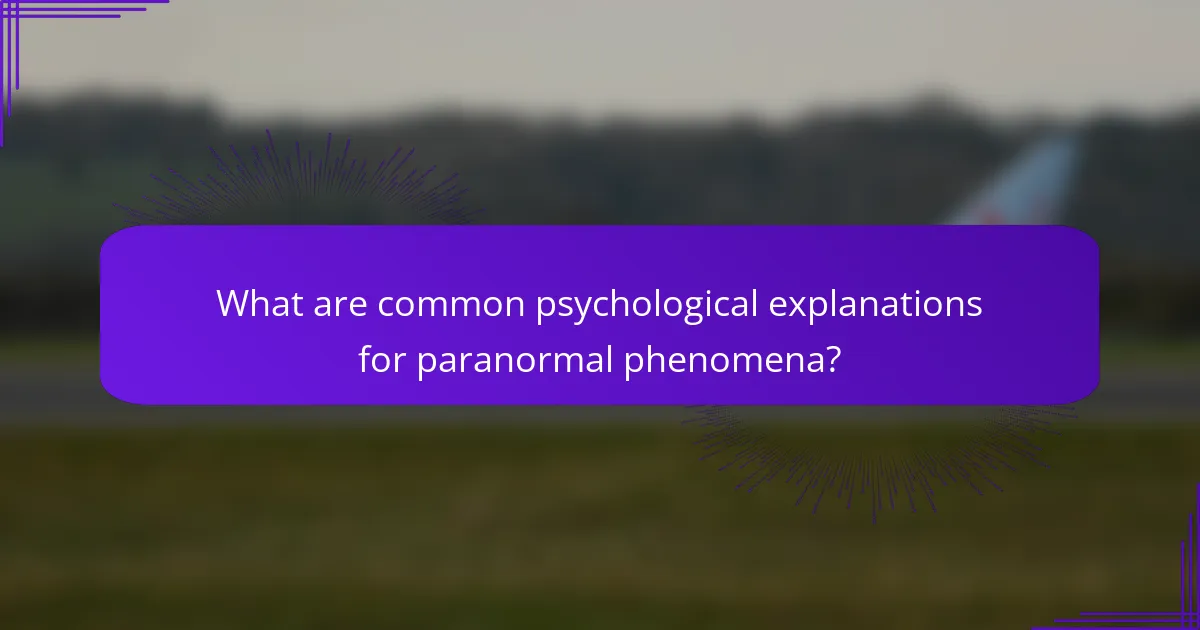
What are common psychological explanations for paranormal phenomena?
Common psychological explanations for paranormal phenomena include cognitive biases, altered states of consciousness, and the influence of social and environmental factors. These elements shape how individuals perceive and interpret experiences that may seem supernatural.
Sleep paralysis and hallucinations
Sleep paralysis occurs when a person is unable to move or speak while falling asleep or waking up, often accompanied by vivid hallucinations. These experiences can lead individuals to perceive a presence in the room, contributing to beliefs in ghosts or other entities. Understanding that sleep paralysis is a natural phenomenon can help demystify these frightening experiences.
To reduce the likelihood of sleep paralysis, maintaining a regular sleep schedule and managing stress can be beneficial. Creating a comfortable sleep environment may also help alleviate anxiety associated with these episodes.
Confirmation bias in paranormal beliefs
Confirmation bias refers to the tendency to favor information that confirms existing beliefs while disregarding contradictory evidence. In the context of paranormal beliefs, individuals may selectively remember experiences that support their views, reinforcing their convictions about the supernatural. This bias can lead to a distorted understanding of reality.
To counteract confirmation bias, actively seeking diverse perspectives and questioning personal beliefs can promote a more balanced view. Engaging with scientific explanations for phenomena can also help challenge entrenched beliefs.
Placebo effect and paranormal experiences
The placebo effect illustrates how belief can influence perception and experience, often leading individuals to feel real effects from treatments or interventions that have no therapeutic value. In paranormal contexts, this effect can manifest when people attribute positive changes in their lives to supernatural causes, reinforcing their belief in paranormal phenomena.
To harness the positive aspects of the placebo effect, individuals can focus on the power of belief in improving well-being. However, it’s essential to remain critical and differentiate between genuine experiences and those influenced by expectation or belief.
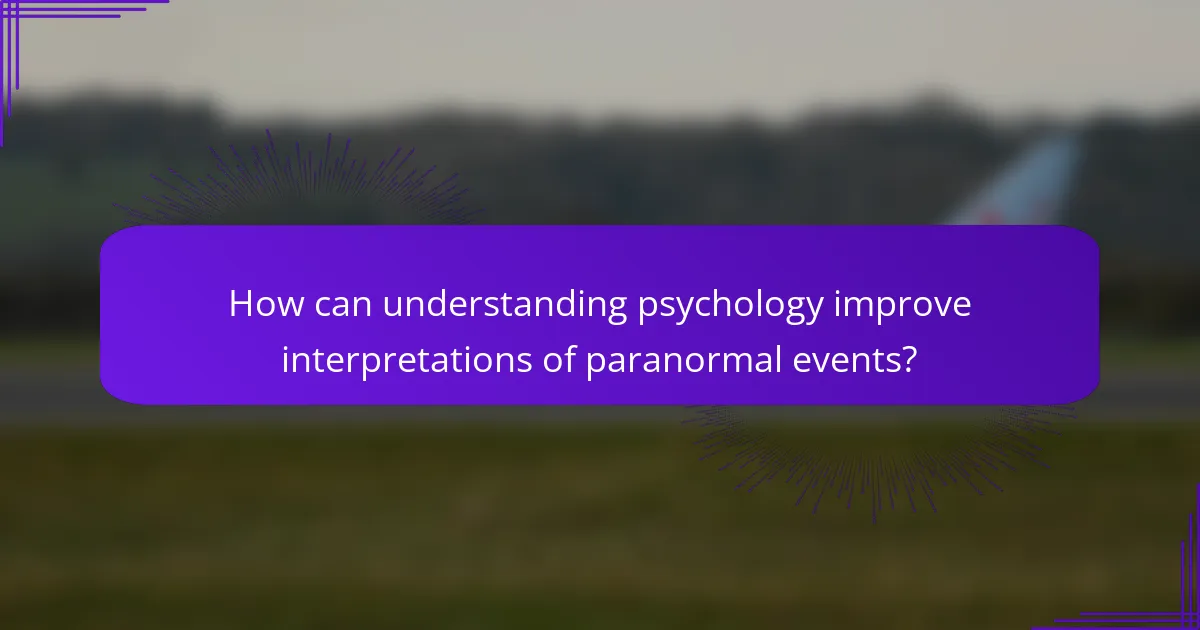
How can understanding psychology improve interpretations of paranormal events?
Understanding psychology enhances interpretations of paranormal events by providing insights into human perception, cognition, and emotional responses. By applying psychological principles, individuals can critically evaluate claims and discern between genuine phenomena and psychological misinterpretations.
Frameworks for analyzing paranormal claims
Several psychological frameworks can be applied to analyze paranormal claims effectively. The cognitive dissonance theory helps explain how individuals reconcile conflicting beliefs, often leading them to accept paranormal explanations when faced with uncertainty. Additionally, the confirmation bias framework illustrates how people tend to favor information that supports their pre-existing beliefs about the paranormal.
Another useful framework is the social constructionism perspective, which posits that our understanding of reality, including paranormal events, is shaped by social interactions and cultural contexts. This means that beliefs in paranormal phenomena can vary significantly across different societies, influenced by local traditions and narratives.
Techniques for critical thinking in paranormal contexts
Employing critical thinking techniques is essential when evaluating paranormal claims. Start by questioning the source of the information—consider whether it comes from a credible expert or an anecdotal account. Look for empirical evidence and seek out studies that have tested the claims scientifically.
Additionally, apply the principle of Occam’s Razor, which suggests that the simplest explanation is often the best. When faced with a paranormal claim, consider whether there are more plausible, non-paranormal explanations that account for the same observations. Keeping a skeptical mindset can help avoid falling into the trap of accepting extraordinary claims without sufficient evidence.
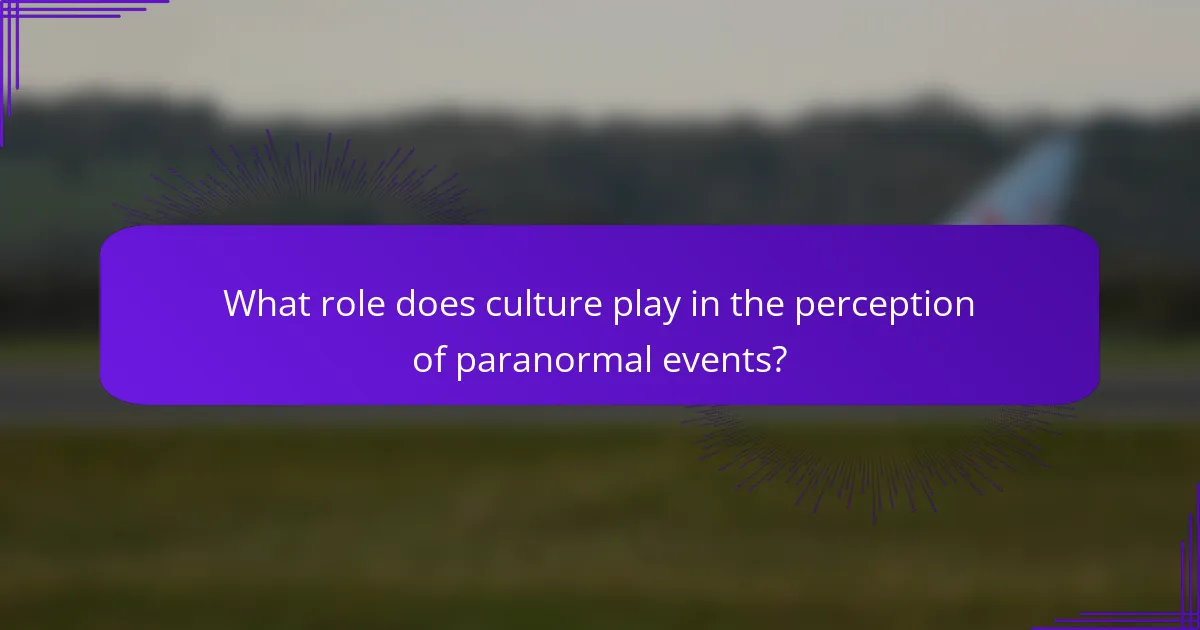
What role does culture play in the perception of paranormal events?
Culture significantly influences how individuals perceive and interpret paranormal events, shaping beliefs and experiences. Different cultural backgrounds provide unique frameworks through which people understand unexplained phenomena, leading to a wide variety of interpretations and responses.
Cultural narratives and paranormal beliefs
Cultural narratives often serve as the foundation for paranormal beliefs, providing stories and explanations that resonate within a community. For example, in many Indigenous cultures, spirits are integral to the understanding of the natural world, influencing how paranormal occurrences are perceived as messages or warnings. These narratives can reinforce or challenge individual beliefs about the supernatural.
Additionally, popular media and folklore can shape cultural attitudes towards paranormal events. Movies, books, and local legends can create a shared understanding that influences how people interpret their own experiences with the paranormal, often leading to heightened sensitivity to unusual occurrences.
Regional variations in paranormal interpretations
Regional differences play a crucial role in how paranormal events are interpreted. For instance, in the United States, ghost hunting and paranormal investigations are popular, often framed as entertainment, while in parts of Asia, encounters with spirits may be taken more seriously and linked to cultural rituals. This can affect how individuals react to similar experiences based on their geographical context.
Moreover, the acceptance of paranormal phenomena can vary widely. In some cultures, belief in the supernatural is commonplace and integrated into daily life, while in others, skepticism prevails. Understanding these regional variations can provide insight into why certain paranormal events are reported more frequently in some areas than others.
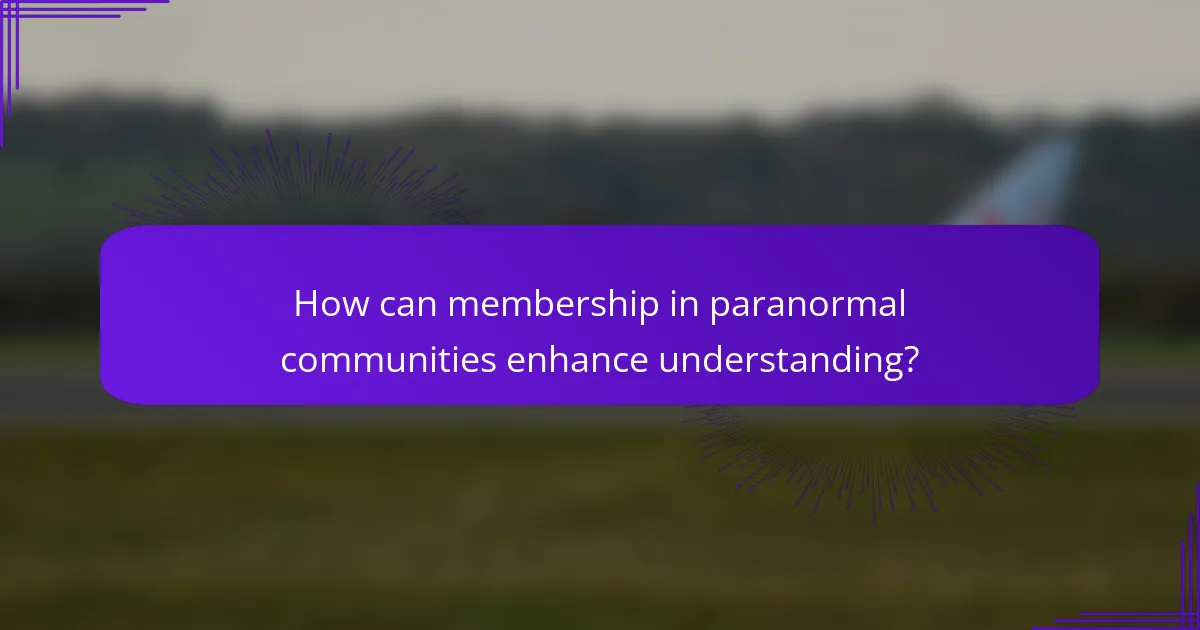
How can membership in paranormal communities enhance understanding?
Membership in paranormal communities can significantly enhance understanding by providing a platform for shared experiences and collective insights. Engaging with others who have similar interests fosters deeper discussions and a broader perspective on paranormal phenomena.
Access to shared experiences and insights
Joining paranormal communities allows individuals to share their personal encounters and interpretations of unexplained events. This exchange of stories can lead to a richer understanding of common themes and patterns in paranormal experiences.
Members often discuss their beliefs, fears, and curiosities, which can help others feel validated and less isolated. This communal knowledge can also challenge preconceived notions and encourage critical thinking about the nature of paranormal events.
Networking with experts in psychology and paranormal studies
Paranormal communities often include professionals from psychology and related fields, providing members with access to expert opinions and research. Networking with these experts can lead to valuable insights into the psychological aspects of belief in the paranormal, such as cognitive biases and social influences.
Engaging with knowledgeable individuals can also facilitate workshops or discussions that explore the intersection of psychology and paranormal studies, helping members to critically analyze their experiences and beliefs. This interaction can enhance both personal understanding and broader community knowledge.
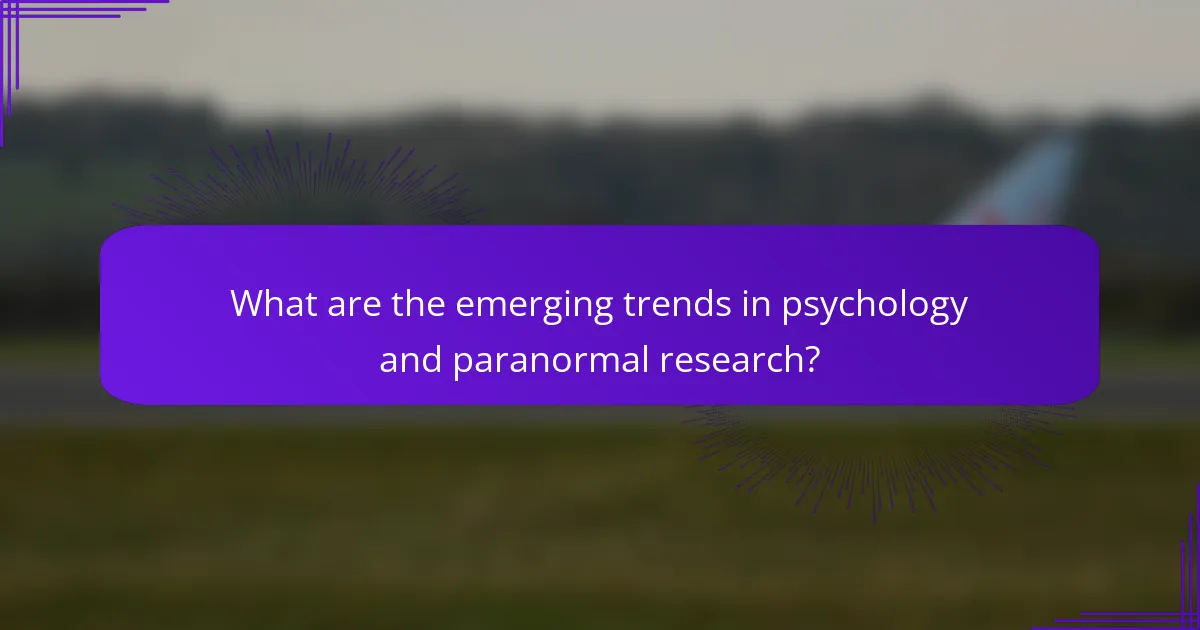
What are the emerging trends in psychology and paranormal research?
Emerging trends in psychology and paranormal research focus on the intersection of mental processes and unexplained phenomena. Researchers are increasingly utilizing scientific methods to explore how perception, cognitive biases, and technology influence interpretations of paranormal events.
Integration of technology in paranormal investigations
The integration of technology in paranormal investigations has transformed how researchers collect and analyze data. Tools such as electromagnetic field (EMF) meters, infrared cameras, and audio recorders are now standard in the field, allowing for more systematic and repeatable investigations.
For example, EMF meters can help identify unusual electromagnetic activity in locations reported to be haunted. Similarly, thermal imaging cameras can detect temperature fluctuations that may correlate with paranormal claims. These technologies provide a more objective basis for evaluating experiences that might otherwise be dismissed as mere anecdote.
However, it is crucial to understand the limitations of these tools. Environmental factors can influence readings, and investigators must be cautious not to jump to conclusions based solely on technological data. A balanced approach that combines technology with psychological insights often yields the most compelling results.
